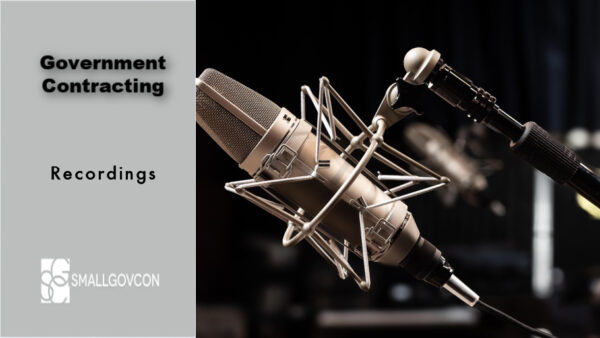In a previous blog post, Why File: An Appeal of SBA’s 8(a) Program Denial, we covered the process for appealing SBA’s denial of admission into the 8(a) Business Development Program (AKA 8(a) Program). We discussed what happens when a business is stopped at the door – denied entry altogether in the program. But what happens when a concern already admitted into the 8(a) Program is terminated by SBA? Here, we will touch on the arguably more consequential scenario of an 8(a) Program participant’s termination from the program. Specifically, the termination process, timing considerations, and OHA’s scope of review.
Continue readingTag Archives: 8(a) Business Development Program
BREAKING: SBA’s Newly-Released 8(a) Program Mandate with “Clarifying Guidance” Regarding Social Disadvantage Criteria Brings Far More Confusion Than “Clarity”
On January 22, 2026, SBA issued brand new “SBA Guidance” to its Office of Government Contracting and Business Development and its Office of Field Operations via a highly confusing 8(a) Program Mandate. On its Website, SBA labels it “Clarifying Guidance That Race-Based Discrimination is Not Tolerated in the 8(a) Program[,]” and further labels it the “Latest Action” in our Federal Government’s “Year-Long Effort to Dismantle DEI Discrimination, Expose Fraud, and Restore Fairness in Federal Contracting[.]” But no matter SBA’s intent behind it, this guidance does everything but clarify even a single aspect of SBA’s 8(a) Program eligibility rules and social disadvantage requirement.
Continue reading2025 8(a) Application Updates (Part I): New Application Countdown Timer
Despite various impacts to SBA’s 8(a) Business Development Program–both quite recently and over the last couple years (which you can read about here and here, and even listen to me talk about here)–this “golden child” of SBA’s socioeconomic programs remains alive and well. And it is still one of the most lucrative and sought after SBA certifications out there. So, eligible contractors may be quite happy to hear, even during this most recent government shutdown, the 8(a) application portal remains up and running. In fact, given the current “pause” to other government contracting functions and filing portals, there may never be a better time than right now to work on those 8(a) applications. That said, anecdotally, we at SmallGovCon have been hearing from some 8(a) applicants about recent updates to the 8(a) application process and submission portal that we want to share with our readers via this two part blog.
Continue readingSmallGovCon Attorney-Author Stephanie Ellis Discusses Small Business Contracting goals on “The Federal Drive”

I recently had the opportunity to discuss small business contracting goals with Terry Gerton, host of “The Federal Drive with Terry Gerton.” This was a follow-up to a post I wrote in July regarding the changing landscape of federal small business government contracting requirements. That post, published earlier in 2025, focused on the changes to small business federal government contracting goals that had been affected by EO 14151.
Continue readingSmall Business Contracting Goals: Current State of Agency Goals
In recent years, the Small Business Administration’s small business contracting goals have been on an upswing, with the requirements growing beyond the statutorily required minimums in an effort to encourage federal agencies to increase awards to small businesses, especially disadvantaged businesses. That is, until now. With the current administration’s focus on “Ending Radical And Wasteful Government DEI Programs and Preferencing,” or Executive Order 14151, there has been a sharp decrease to the small disadvantaged business contracting goals set for federal agencies, but an increase to many of the agencies’ overall small business contracting goals. Read on to learn more about these changes, as well as some potential impacts of the new small business contracting goals.
Continue readingSBA Announces an Audit of 8(a) Program Contracts
SBA has announced that it will be auditing the 8(a) Program in a recent press release entitled: “Administrator Loeffler Orders Full-Scale Audit of 8(a) Contracting Program.” 8(a) Participants and former Participants should be aware that SBA will be focusing on a review of contracts issued under the 8(a) Program.
Continue reading[1st Ever Bilingual] Webinar Announcement: The SBA 8(a) Program, June 26, 2025, 12:30 PM – 2:30 PM CDT
Are you a disadvantaged small business owner looking for a leg-up in the federal marketplace? Well, this is your chance!
Puerto Rico APEX Accelerators are hosting a FREE webinar to help you understand how the SBA 8(a) Business Development Program can open the door to exclusive contracting opportunities. And in very exciting news, this will actually be our firm’s first ever bilingual webinar! Indeed, our very own Nicole Pottroff will put her years of Spanish education to the test in an effort to maximize accessibility to this valuable information about federal government contracting. Webinar will be presented in English with Q&A to follow in Spanish.
✅ What You’ll Learn:
- How the SBA 8(a) program works and why it matters
- Key benefits like sole-source contracts and federal mentorship
- Eligibility requirements and how to apply
- Common mistakes that can delay or deny certification
- Live Q&A (*in Spanish) with a top expert in federal contracts law attorney, Nicole Pottroff
- Tips for starting your application
💼 Who Should Attend?
- Small business owners aiming to grow through federal contracting
- Government contracting consultants
- Entrepreneurs seeking new growth avenues
📅 Spots are limited – register now to reserve your place!
👉 Register here.
